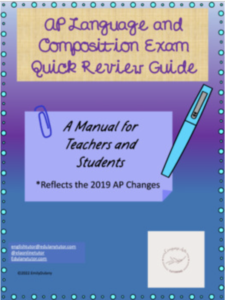
T-minus FIVE weeks and counting until AP exams begin!
This Week’s Skill: Rhetorical Situation
Last week, I started with a review of style for a reason. This topic lays much of the foundation for the skills that will appear on the AP Language and Composition Exam. On the test, you will be asked to assess a writer’s choices deeply and thoroughly. This week, we’ll tackle the rhetorical situation as it applies to a piece of non-fiction text. This will provide a clearer idea of how to analyze the style that author’s use when crafting their words.
The components included in the rhetorical situation are exigence, audience, writer, purpose, context, and message. These ideas simply give a focal point for analysis. Don’t panic if you weren’t familiar with the term ‘exigence’ before taking the AP Language and Composition course. While this term is rarely used in life and is, in fact, somewhat new to AP Language and Composition courses as of the 2019 changes, it allows a reader to note important information about the passages they will analyze.
Exigence
Exigence asks readers to understand the urgency of the situation. Why was this speech given at this moment? Why did this passage need to be written at this time? Exigence creates a union between the reader and the audience who would have heard or read this information at the time it was given. For example, if the speech was written about a major war while the war was happening, the speaker or writer may present their feelings about this war through their writing because it was a current hot topic. When (if) you hear the term exigence, simply think to yourself, “why now?”
Audience

Considering the audience is another key factor in understanding rhetoric. If the writing or speech is for a particular group or individual, this will impact the effect of the piece. Factors such as tone and voice are included in the way the author writes or speaks, and, if the piece is old, a student analyzing this even decades later should be able to pick up on the way the author may have felt at the time they wrote the information.
Writer

Who the writer or speaker is can greatly impact the way a reader feels about a passage of writing. Though personal feelings about the author should remain neutral when writing about their work, a student can and should note any influence this person had on the period they were writing in and discuss any issues which were important for the writer. Typically, the passage will contain some brief biographical information about the writer so that a student has some direction in giving their response. Look for these clues to learn more about the writer before you analyze their writing.
Purpose

The purpose of the writing can overlap with information from other components of the rhetorical situation. When trying to discover the purpose of the piece, search for any prominent sentences throughout the writing which may give some clues about the purpose. The purpose is something that the reader infers with clues from the writer. Ask yourself: Is the purpose to inform, persuade, inspire, convince, etc? It would be lucky to see the author stating their exact purpose at the beginning of a passage, but most of the time students need to read the overall piece to decipher the purpose.
Context

Like exigence, context asks readers to consider the bigger picture. What was happening in the world when this writing or speech was created? If you don’t know, read the blurb before the passage begins to find clues about what was taking place historically. Typically on the AP exam, passages are chosen so that students will have something to write about when making this connection, so context will most likely be given within the author’s bio information or within the early parts of the passage.
Message

The message of a passage focuses more on what feelings are evoked once the reader finishes the piece. Look for any tone shifts throughout the passage as this may indicate a writer getting to a main point that they want to make. Also, search the final lines of the passage. Is the writer making any final points to make sure they leave the audience with their main point? Many times, the message of their writing (or hints of it) will appear in this location.
Practice Time!!
Let’s take another look at William Faulkner’s Nobel Prize acceptance speech in December of 1950. Unlike last week’s post, this time, the entire speech is below so that you can analyze the message. Try to mentally note any aspects of the rhetorical situation as you read:
Ladies and gentlemen,
I feel that this award was not made to me as a man, but to my work – a life’s work in the agony and sweat of the human spirit, not for glory and least of all for profit, but to create out of the materials of the human spirit something which did not exist before. So this award is only mine in trust. It will not be difficult to find a dedication for the money part of it commensurate with the purpose and significance of its origin. But I would like to do the same with the acclaim too, by using this moment as a pinnacle from which I might be listened to by the young men and women already dedicated to the same anguish and travail, among whom is already that one who will some day stand here where I am standing.
Our tragedy today is a general and universal physical fear so long sustained by now that we can even bear it. There are no longer problems of the spirit. There is only the question: When will I be blown up? Because of this, the young man or woman writing today has forgotten the problems of the human heart in conflict with itself which alone can make good writing because only that is worth writing about, worth the agony and the sweat.
He must learn them again. He must teach himself that the basest of all things is to be afraid; and, teaching himself that, forget it forever, leaving no room in his workshop for anything but the old verities and truths of the heart, the old universal truths lacking which any story is ephemeral and doomed – love and honor and pity and pride and compassion and sacrifice. Until he does so, he labors under a curse. He writes not of love but of lust, of defeats in which nobody loses anything of value, of victories without hope and, worst of all, without pity or compassion. His griefs grieve on no universal bones, leaving no scars. He writes not of the heart but of the glands.
Until he relearns these things, he will write as though he stood among and watched the end of man. I decline to accept the end of man. It is easy enough to say that man is immortal simply because he will endure: that when the last dingdong of doom has clanged and faded from the last worthless rock hanging tideless in the last red and dying evening, that even then there will still be one more sound: that of his puny inexhaustible voice, still talking.
I refuse to accept this. I believe that man will not merely endure: he will prevail. He is immortal, not because he alone among creatures has an inexhaustible voice, but because he has a soul, a spirit capable of compassion and sacrifice and endurance. The poet’s, the writer’s, duty is to write about these things. It is his privilege to help man endure by lifting his heart, by reminding him of the courage and honor and hope and pride and compassion and pity and sacrifice which have been the glory of his past. The poet’s voice need not merely be the record of man, it can be one of the props, the pillars to help him endure and prevail.
Now, using what you know about the components of the rhetorical situation, practice identifying and analyzing the following based on Faulkner’s speech:
- Exigence:
- Audience:
- Writer:
- Purpose:
- Context:
- Message:
Identifying these key rhetorical situations on the actual exam will need to happen quickly because time goes fast on test day. The more you practice reading non-fiction passages and analyzing the rhetoric, the more you will gather the skills for how to answer multiple choice questions or write an essay response on the AP Language and Composition Exam. Keep practicing with any samples you are given in class and check College Board information for more practice as you get closer to the test. One more reminder …if you need an AP Quick Review Guide as the exam gets closer, you can find one available on my TeachersPayTeachers site. Good luck and keep preparing! You can do this!
edulany
23 Mar, 2022

